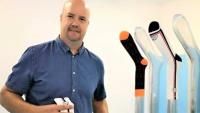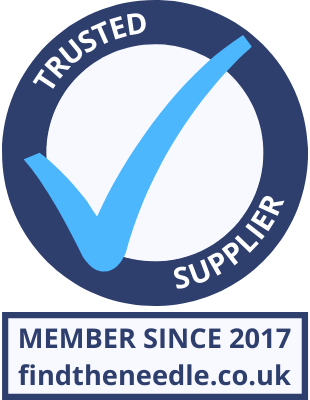 Add My Company
Add My Company
Sign In

Bulgarians do not concern themselves with wheather the products they use are environmentally friendly or not
Used clothing materials and other textile products are valuable material that should not be thrown in the land field. The Bulgarian-based company Kingly Ltd. knows that very well. We spoke to Robert Armour, CEO of the firm, about the consumer behavioral model, how important it is to give a second chance to clothing and textile wastage in terms of leaving a better environmental footprint, as well as if Bulgaria is picking up on that trend.
Kingly Ltd. is a member of the British-Bulgarian Business Association (BBBA), British Promotional Merchandise Association (BPMA) and Promotional Products Association International (PPAI).
Can you tell us a little bit more about Kingly and your activities in Bulgaria?
Kingly is a producer and supplier for knitted socks, sweaters, and other textile apparel. We sell to the trade and agency resellers that represent giants like Coca-Cola, Samsung, Google, Michelin and many more. We have branches in Bulgaria, Great Britain, and the United States. Our main market consists of the European Union countries and the USA.
The company is constantly pursuing all paths to a more secure and beneficial environment for all. We successfully launched upcycled socks packaged into compostable bags in 2019. The market accepted it in a very favorable way and as a result of it, we won the Promotional Gift Award.
We have no plans to open factories abroad. The reason is that just recently we upgraded to 5 times larder production facility which allows us to grow in the same location.
Which countries do you export the products to?
The most positive response we have had for our upcycled socks came from the United Kingdom, Iceland, France, and Germany. The other countries are adopting these environmentally friendly solutions in the textile industry at a slower pace.
When was the company founded and what was its purpose?
The company was founded in 2014. The purpose behind its existence was to become a major player in eco-sustainable apparel. We created a company based on the circular economy – we have the chance to close the production loop when it comes to producing textile products and to use the textiles wastage. The demand for such products is higher than ever before and this is a subject that has always been the heart of everything that Kingly holds dear. For instance, take our upcycled socks. 80% of the sock in fact is made from upcycled cotton.
Having worked 20-25 years in the textile industry, having worked in factories you get to see some very frightening things. For example, when the cotton bales come in, and then the production process starts, it is alarming to see that hundreds of liters of water are required for such a small amount of cotton. It can be dyed in different kinds of cotton. And then you find out that these dyes are extremely dangerous to the environment. When all that dying is finished, that water is flushed into the siege system, so you can pollute the water supply. It is bad for the fish, its bag for your health.
The clash with reality opened our eyes. People don’t actually realize that cotton, for example, is a very trusty crop. And to cultivate 1 kilo of cotton, you need up to 20 000 litres of water which is just crazy. On the basis of that, we decided to predominantly focus on eliminating all these unnecessary chemical dyes and water. If we follow the steps of upcycling. Which is taking something which is already in existence, and without the use of water, chemicals, we can make it something better. That is how we ended up using upcycled yarn from textile waste for the creation of upcycled socks that we packed in compostable bags.
Can you tell us a little bit more about the production process?
We have to quickly explain what recycling is, so people can understand what upcycling is. In textile production there are some materials, factory cut-offs that don’t get used – it’s a mixture of T-shirts, towels, table cloths. What happens is that textile wastage results in a new production process taking place. Recycling is very good because they are using textile that has already been produced. But what they don’t like to say is that recycled waste is subjected to a new manufacturing process whereby water and chemicals are going to be used all over again to produce something new.
The difference with the process that we are focusing on – upcycling, is bringing in textile wastage, separating it and without the use of water or chemical, mashing it up and converting it into yarn that can be used to knit socks and sweaters. That is what upcycling is – taking something that is already in existence and transforming it into something else without any negative environmental impact. We are using a supplier from Spain to get the textile wastage that we use.
An interesting example of upcycling is if Lufthansa take an old airbus and they cut off sections of the wing, of the fuse lash to make coffee tables. They cut of a part of the wing, they take it off and they don’t apply another coat of paint. They cut off the wing, and they put a bit of glass on top and that’s a finished coffee table without using chemicals or paint.
Are you producing only socks and sweaters or you have plans for expanding the upcycled products line?
Last year we launched the upcycled socks made from upcycled yarn. Now we are introducing the upcycled sweaters. And next week, it is the knitted scarfs and beanies from upcycled yarn.
And how do you calculate the environmental savings?
We use a special algorithm that calculates exactly how much energy, water, and CO₂ have been saved. We even have the possibility to determine how much space has been prevented from being turned into a land field. For a little bit more than a year we have produced about 75 000 socks. Our calculations show that producing even a single pair of socks can prevent the waste of 1300 litres of water.
Last year the amount of textile waste that our partners have managed to turn into upcycled yarn is over 27 million kilos. According to their data in 2019 40 billion litres of water have been prevented from being wasted. And the amount of toxic chemicals that haven’t been used is over 2,9 million kilos. Harmful CO₂ have dropped dramatically – with 54,5 million kilos, and the saved energy is 142 million kW/h. Moreover, the space that has been prevented from turning into a land field is 6,7 million m².
Can the products be found in retail or just online?
At the moment we work primarily with corporate clients and don’t have any stores but we are planning to focus on retail a little bit more in the nearest future.
What is the price of a pair of socks?
We sell to the trade 1000 pairs of upcycled socks for 1,64 euro. All custom made, packaged with the sock tag. 250 pairs of sweaters are about 16 euros.
Do you think people in Bulgaria care about ecological footprint? Do you think it will happen in the years ahead?
I think in Bulgaria people are not that concerned, but in the United Kingdom, Ireland, France and Germany there is a huge uptake on sustainability that people here don’t understand. There are a lot of people here that don’t understand the importance of it. I think in Bulgaria you are going to need 10-15 years before you can change that dynamic.
Do you think that giants like Coca Cola and Google can really express their concern about the environment through ordering sustainable solutions?
We get our main orders from England, France, Germany. The products are meant for different promotional events which are usually organized by Coca-Cola in Great Britain, Heineken in the Netherlands, or Samsung in Germany or France. In other words, the orders come from the big branches, not the local ones. These are companies that have their corporate social responsibility objectives and that is the reason behind choosing eco-sustainable products. We have been witnessing that for quite some time. It seems that the Eastern Bloc countries don’t get the opportunity to make these decisions.
Is that the future – creating products that preserve the environment?
I know that the whole world loves the “fast fashion”. A lot of people don’t care what is the truth behind the production of garments. We see upcycling as a very positive trend for our market, for the promotional market. Because we produce for companies – for Samsung, Coca Cola, for Michelin, etc. These are companies that have incorporated in corporate social responsibility objectives the thing eco-sustainability. Currently, we are sensing that it is a lot more important for Business to Business that it is on a retail level. The famous H&M chain for example has a tiny line for organic cotton. Organic cotton is good too, but it is not as good as upcycled.
The demand for sustainable promotional products is growing. In the last 6 weeks, especially post Covid-19 everyone who is restarting their business, wanting to order socks and business gifts, puts big focus now on sustainability. It shows your corporate value, what your company stands for, what it represents. It is becoming increasingly more and more important now. But in retail, in 30- or 40-years time, you will probably find 3-4% of the entire world retail is doing to be upcycled if we are lucky. Because it is all about money. When it is upcycled, there will never ever be enough textile wastage for the world to want to go upcycled, unfortunately.
—
The interview was originally published in Bulgarian in Economic.bg
For more information on World-renowned giants order eco-friendly socks from Bulgaria talk to KINGLY LTD
Enquire Now
List your company on FindTheNeedle.

